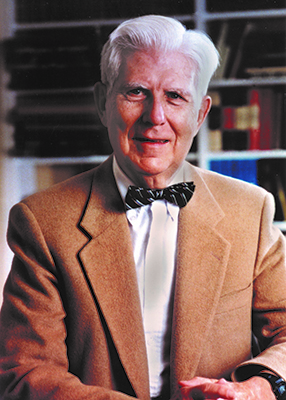
Recognizing a Century of Life & Groundbreaking Contributions to the Field of Psychiatry
Aaron T. Beck, M.D., was the globally recognized father of Cognitive Behavior Therapy (CBT). Dr. Beck is credited with developing the revolutionary therapy at the University of Pennsylvania in the 1960s, an effective treatment for a wide range of psychiatric disorders, psychological problems, and medical conditions with psychological components, as demonstrated in over 2,000 clinical studies. In recognition of his work, the American Psychologist has called Dr. Beck “one of the five most influential psychotherapists of all time.”
A Revolutionary Treatment for Depression
His pioneering work on depression profoundly altered the way this disorder is understood and treated. Dr. Beck and his colleagues systematically extended the initial work on depression to conditions as diverse as anxiety and phobias, personality disorders, drug and alcohol abuse, marital discord, and schizophrenia. Extensive research demonstrates that CBT provides an effective treatment for a variety of conditions that had largely been treated with medication.
Widely Read and Written
A prolific and productive researcher with a career that spanned more than 70 years, Dr. Beck had published over 600 articles and authored or co-authored 25 books. He was also the recipient of numerous awards, including the 2006 Albert Lasker Award for Clinical Medical Research and the Gustave O. Lienhard Award from the Institute of Medicine for “outstanding national achievement in improving personal health care services in the United States.” Just last year he published an influential treatment manual that extends the principles of CBT to an intervention that assists individuals who experience significant mental health challenges in living fulfilling and rewarding lives.
Recovery-Oriented Cognitive Therapy
Dr. Beck’s recent work on the development of Recovery-Oriented Cognitive Therapy (CT-R) is a revolutionary new practice that may change the future of psychotherapy. Originally developed to empower individuals diagnosed with schizophrenia, CT-R extends the principles of traditional CBT to help individuals suffering from extensive behavioral, social, and physical health challenges. Practitioners and researchers are now applying the underlying principles of CT-R to the treatment of depression, anxiety, substance use, self-injury, aggression, and more.
The Aaron T. Beck Institute at Assumption University
Dr. Beck offered his name and support to the Aaron T. Beck Institute for Cognitive Studies at Assumption University. The institute offers clinical workshops on the development and implementation of CBT (and related evidence-based psychosocial interventions) to mental and behavioral health professionals and graduate students to support ongoing professional development. Founded in 1996, the institute attracts CBT practitioners from around the globe who present and attend workshops and lectures at the University.
Dr. Beck’s Exemplary Academic Credentials
Dr. Beck graduated magna cum laude from Brown University in 1942. He was elected to membership in Phi Beta Kappa. He earned his MD at Yale University in 1946. After completing medical residencies and internships, as well as service in the United States Military at an army hospital, Dr. Beck joined the faculty in the Department of Psychiatry at the University of Pennsylvania. He retired from the University of Pennsylvania in 1992 as University Professor Emeritus of Psychiatry. In 1995, Assumption awarded Dr. Beck a Doctor of Humane Letters honorary degree for his contributions to the development of CBT.


